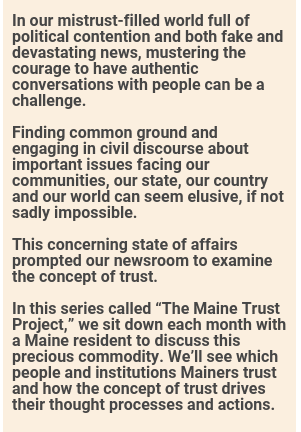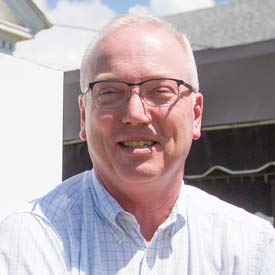SOUTH PARIS — As the director of six funeral homes in western and central Maine, Dana Chandler sees people during some of the most emotional times of their lives. The death of a loved one is an incredibly vulnerable time, and he understands how important it is that these hurting people can lean on him and trust him to take the utmost care of the deceased, their reeling family, and family secrets.
 “When they come in, if they’re upset, we hear a lot of the family history,” he said. “We hear things that you can’t discuss anywhere.”
“When they come in, if they’re upset, we hear a lot of the family history,” he said. “We hear things that you can’t discuss anywhere.”
When families unload decades of family secrets on him, they are placing a level of trust in him akin to the sacredness of the confessional. That is a responsibility he feels deeply, but one he shoulders with ease. It is, after all, practically in his DNA.
Dana has been a funeral-service professional for 37 of his 58 years, but he grew up in the business – literally. At the age of five, he, his younger sister and his parents moved into the Gallant-Raymond Funeral Home on West Dwinal Street in Mechanic Falls, where his father took a job as the funeral director in 1966.
As he grew up, getting a ride to school in a hearse and playing hide and seek among the caskets in the funeral home’s selection room just seemed normal to him and his sister. So did having the entire community come through their front door.
“It’s kind of a hub of the community because not everybody goes to church, and they don’t all go to the same church,” he said. “Not everybody shops at the same place. But, in general, in a small town, everybody goes to the same place to be buried.”
That’s only true if the members of the community trust the people at the funeral home, he said. “You’re judged by the community as to what you do,” he said.
Even though people in Mechanic Falls watched him grow up in the funeral home, when he became the funeral director there after his father retired, he still had to prove to the community that he, like his father, could be trusted.

When he started at 21, he heard comments such as “You’re young,” and “Do you have any idea what you’re doing?” But he made the effort to build trust and keep it.
The key to achieving that, he said, is consistently doing what he says he’s going to do, keeping family secrets confidential, and listening without judgement. “You can’t judge anybody,” he said. “Everybody has their own life and their own story. I’m no better than anybody that walks through that door.”
And that has worked. He is well known in the communities he works in – South Paris, Bethel, Fryeburg, Mechanic Falls, Bridgton, and Oxford. The staff at the funeral homes he owns discourage him from sweeping out front along the road because he usually spends more time talking to people than sweeping. “I can walk from here to the town office (in South Paris) and people honk and wave,” he said. “That’s how life is supposed to be lived.”
It’s like that Mastercard commercial, he noted. Trust is priceless. “It’s very valuable to those of us who truly need it and want it,” he said. “It’s very valuable to be trusted.”
Q&A
Who meets your definition of trust?
Dana: I pretty much trust everybody until I’m proven wrong. It’s amazing how much we do in life, if you think about it, that comes down to trust. You have to trust your doctor because if you didn’t, you wouldn’t go. That’s why when you get (a doctor) you trust, you hang on for a lifetime. It’s the same thing here. We see the same families over and over – for generations. We’re their comfortable, fuzzy slipper. Why would you do business with somebody you don’t trust? So it’s important.
Who doesn’t meet your definition of trust?
Dana: I’m not a real big fan of anybody in the political world. Did you ever notice how normal they seem when they knock on your door and they’re running for state legislature or something? You know them through Kiwanis or the Masons or something in town, but, by God, they get to Augusta or Washington and they become flaming idiots and you can’t trust a word they say because they’re only out for what’s going to benefit them. Trust benefits all of us. All parties involved benefit from a trustful situation. They just seem to be working for their own benefit.
What breaks trust for you?
Dana: If you promise to be somewhere or do something for me and you don’t deliver. The first time, I’ll be upset, but the second time, it’s pretty much over. I don’t believe in holding grudges, though. We see that often. We see people who come in and so-and-so hasn’t talked to her sisters, who live in town, for 50 years. Four out of five of them can’t tell you what the problem was. They can’t remember why they stopped talking. You’ve spent a lifetime not talking to each other over something you don’t remember? It just doesn’t seem like that’s worth it. You don’t get anywhere holding a grudge against people.
Can broken trust be healed, and, if so, what has to happen for healing to take place?
Dana: I think so. It can be worked out through a lot of hard work from both sides and by being honest.
Do you think the cultural definition of trust has changed, and if so, how?
Dana: I don’t think people are brought up to be trusting any more. The older generation – those in their 80s and 90s – has lots of it because they remember a time when you could live on Main Street in any town and leave your door unlocked, leave your windows wide open, leave your car unlocked with the keys in it – and nothing happened. I’m not sure what caused things to change, but the lack of it is not good because when you lose trust, then we’re just going to become a real angry group of people, and that’s what we see some days now. When we watch the news and read the papers and the comments that are made – it’s like, oh my lord, what are we doing?
What worries you?
Dana: The struggle to stay in business and to stay relevant so that the internet doesn’t take over the business. And finding help. There’s nobody out there.
What inspires you?
Dana: All the people that come through the door. I just like the people. Some of their stories are really incredible.
What issues do you think are important today?
Dana: I am worried about spending. Suffice to say, I lean towards the moderate to conservative style of spending my tax money, and I don’t believe we’re living that lifestyle right now. There’s a lot of spending and there’s not a lot of us left in this state to pay. There’s only so much those of us who are putting money in the pot can put in and still survive.
Please share a memorable trust moment.
Dana: Any time the phone rings and a family calls us — that’s a trust moment. They can call anyone.
Get to know Dana Chandler
Age: 58
Hometown: Norway
Religious affiliation: He attends a church, but believes that you don’t have to have a seat in a pew to be a spiritual person.
Political affiliation: Independent
How he describes himself: A trusting people-person who tries to treat everybody as if he were in their shoes.
How he defines trust: It’s when somebody does what they say they’re going to do – a reliability. A feeling of whether they are going to be trustworthy, or they’re just blowing wind.







